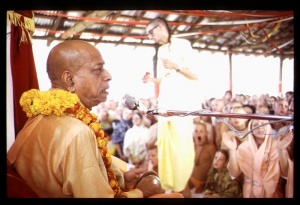SB 9.20.34: Difference between revisions
m (1 revision(s)) |
(Vanibot #0054 edit - transform synonyms into clickable links, which search similar occurrences) |
||
| (One intermediate revision by one other user not shown) | |||
| Line 1: | Line 1: | ||
{{info | {{info | ||
|speaker= | |speaker=Śukadeva Gosvāmī | ||
|listener=King | |listener=King Parīkṣit | ||
}} | }} | ||
[[Category:Srimad-Bhagavatam - Canto 09 Chapter 20]] | |||
[[Category:Bhagavatam Verses Spoken by Sukadeva Gosvami - Vanisource|092034]] | |||
<div style="float:left">'''[[Srimad-Bhagavatam]] - [[SB 9|Ninth Canto]] - [[SB 9|Ninth Canto]] - [[SB 9.20: The Dynasty of Puru|Chapter 20: The Dynasty of Pūru]]'''</div> | |||
<div style="float:right">[[File:Go-previous.png|link=SB 9.20.33]] '''[[SB 9.20.33]] - [[SB 9.20.35]]''' [[File:Go-next.png|link=SB 9.20.35]]</div> | |||
{{RandomImage}} | |||
==== TEXT 34 ==== | ==== TEXT 34 ==== | ||
<div | <div class="verse"> | ||
tasyāsan nṛpa vaidarbhyaḥ | :tasyāsan nṛpa vaidarbhyaḥ | ||
patnyas tisraḥ susammatāḥ | :patnyas tisraḥ susammatāḥ | ||
jaghnus tyāga-bhayāt putrān | :jaghnus tyāga-bhayāt putrān | ||
nānurūpā itīrite | :nānurūpā itīrite | ||
</div> | </div> | ||
| Line 17: | Line 22: | ||
==== SYNONYMS ==== | ==== SYNONYMS ==== | ||
<div | <div class="synonyms"> | ||
''[//vanipedia.org/wiki/Special:VaniSearch?s=tasya&tab=syno_o&ds=1 tasya]'' — of him (Mahārāja Bharata); ''[//vanipedia.org/wiki/Special:VaniSearch?s=āsan&tab=syno_o&ds=1 āsan]'' — there were; ''[//vanipedia.org/wiki/Special:VaniSearch?s=nṛpa&tab=syno_o&ds=1 nṛpa]'' — O King (Mahārāja Parīkṣit); ''[//vanipedia.org/wiki/Special:VaniSearch?s=vaidarbhyaḥ&tab=syno_o&ds=1 vaidarbhyaḥ]'' — daughters of Vidarbha; ''[//vanipedia.org/wiki/Special:VaniSearch?s=patnyaḥ&tab=syno_o&ds=1 patnyaḥ]'' — wives; ''[//vanipedia.org/wiki/Special:VaniSearch?s=tisraḥ&tab=syno_o&ds=1 tisraḥ]'' — three; ''[//vanipedia.org/wiki/Special:VaniSearch?s=su&tab=syno_o&ds=1 su]-[//vanipedia.org/wiki/Special:VaniSearch?s=sammatāḥ&tab=syno_o&ds=1 sammatāḥ]'' — very pleasing and suitable; ''[//vanipedia.org/wiki/Special:VaniSearch?s=jaghnuḥ&tab=syno_o&ds=1 jaghnuḥ]'' — killed; ''[//vanipedia.org/wiki/Special:VaniSearch?s=tyāga&tab=syno_o&ds=1 tyāga]-[//vanipedia.org/wiki/Special:VaniSearch?s=bhayāt&tab=syno_o&ds=1 bhayāt]'' — fearing rejection; ''[//vanipedia.org/wiki/Special:VaniSearch?s=putrān&tab=syno_o&ds=1 putrān]'' — their sons; ''[//vanipedia.org/wiki/Special:VaniSearch?s=na&tab=syno_o&ds=1 na] [//vanipedia.org/wiki/Special:VaniSearch?s=anurūpāḥ&tab=syno_o&ds=1 anurūpāḥ]'' — not exactly like the father; ''[//vanipedia.org/wiki/Special:VaniSearch?s=iti&tab=syno_o&ds=1 iti]'' — like this; ''[//vanipedia.org/wiki/Special:VaniSearch?s=īrite&tab=syno_o&ds=1 īrite]'' — considering. | |||
</div> | </div> | ||
| Line 24: | Line 29: | ||
==== TRANSLATION ==== | ==== TRANSLATION ==== | ||
<div | <div class="translation"> | ||
O King Parīkṣit, Mahārāja Bharata had three pleasing wives, who were daughters of the King of Vidarbha. When all three of them bore children who did not resemble the King, these wives thought that he would consider them unfaithful queens and reject them, and therefore they killed their own sons. | O King Parīkṣit, Mahārāja Bharata had three pleasing wives, who were daughters of the King of Vidarbha. When all three of them bore children who did not resemble the King, these wives thought that he would consider them unfaithful queens and reject them, and therefore they killed their own sons. | ||
</div> | </div> | ||
__NOTOC__ | |||
<div style="float:right; clear:both;">[[File:Go-previous.png|link=SB 9.20.33]] '''[[SB 9.20.33]] - [[SB 9.20.35]]''' [[File:Go-next.png|link=SB 9.20.35]]</div> | |||
__NOTOC__ | |||
__NOEDITSECTION__ | |||
Latest revision as of 23:51, 18 February 2024

His Divine Grace
A.C. Bhaktivedanta Swami Prabhupada
A.C. Bhaktivedanta Swami Prabhupada
TEXT 34
- tasyāsan nṛpa vaidarbhyaḥ
- patnyas tisraḥ susammatāḥ
- jaghnus tyāga-bhayāt putrān
- nānurūpā itīrite
SYNONYMS
tasya — of him (Mahārāja Bharata); āsan — there were; nṛpa — O King (Mahārāja Parīkṣit); vaidarbhyaḥ — daughters of Vidarbha; patnyaḥ — wives; tisraḥ — three; su-sammatāḥ — very pleasing and suitable; jaghnuḥ — killed; tyāga-bhayāt — fearing rejection; putrān — their sons; na anurūpāḥ — not exactly like the father; iti — like this; īrite — considering.
TRANSLATION
O King Parīkṣit, Mahārāja Bharata had three pleasing wives, who were daughters of the King of Vidarbha. When all three of them bore children who did not resemble the King, these wives thought that he would consider them unfaithful queens and reject them, and therefore they killed their own sons.